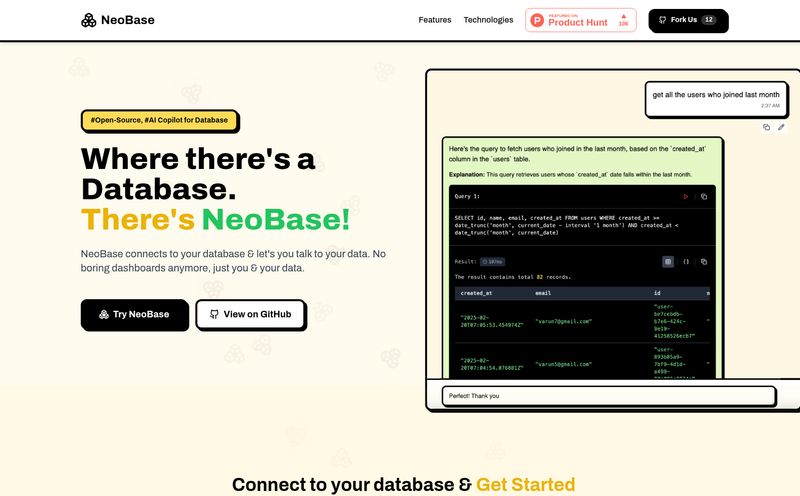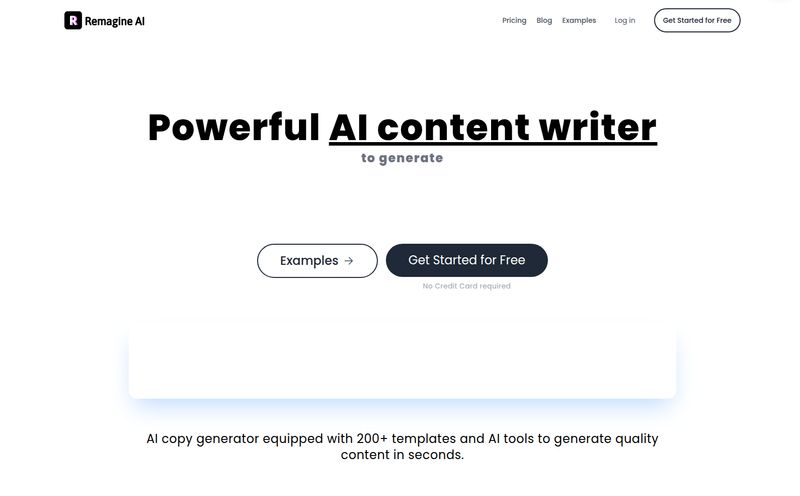In my line of work, I see the term 'AI' slapped onto just about everything. AI-powered toasters, AI-driven cat flaps... you get the idea. It’s become a bit of a running joke in the SEO and tech community. Most of the time, it's just a fancy new label for a slightly more complex algorithm. So, when I stumbled upon Biblical AI, my professional skepticism immediately kicked in. An AI that specializes in the Bible? For free? Color me intrigued. But also, wary.
The digital space is flooded with tools promising to revolutionize how we do things, from generating traffic to writing content. I've seen dozens of them. Some are game-changers, most are duds. I had to know which category Biblical AI fell into. Is it a genuinely useful tool for study and research, or just another GPT wrapper with a holy coat of paint? I decided to roll up my sleeves, pour a fresh cup of coffee, and give this digital disciple a proper test drive.
So, What Is Biblical AI, Really?
At its core, Biblical AI pitches itself as a free AI assistant designed to make the Bible more accessible. It’s not just for the hardcore theologians in their ivory towers or seminary students buried under a mountain of books. It’s also for your average Joe or Jane who's just curious about a story they heard once, or wants to understand a specific passage without getting tangled in centuries of interpretation.
According to their site, the platform is powered by something called SmartiePal's AI. This is an interesting little detail. It suggests that Biblical AI is a specialized application of a broader, more powerful engine, trained specifically on a rich knowledge base of biblical texts, history, and theological concepts. It’s designed to answer your questions, summarize chunks of scripture, and provide a bit of that all-important historical and theological context. Think of it less as a search engine and more like a chat with a very, very knowledgeable research assistant who only wants to talk about one book.
First Impressions and The User Experience
Landing on the Biblical AI website feels… clean. Almost zen. There are no flashing banners, no aggressive pop-ups demanding your email. It’s minimalist, with a simple, intuitive layout. You’re basically presented with a chat interface and an invitation to ask a question. That’s it. In an age of cluttered, noisy websites, this simplicity is a breath of fresh air.
There was no complex signup, no demand for a credit card. It’s genuinely free to start using, which immediately lowers the barrier to entry. I have to give them props for that. Too many tools hide their best features behind a paywall or a convoluted onboarding process. This felt different. It felt… open.

Visit Biblical AI
Putting the AI to the Test
Okay, let’s get to the good stuff. How does it actually perform? A pretty interface is nice, but if the AI gives you garbage answers, it’s useless. I decided to throw a few different types of questions at it, ranging from softball to something a bit more nuanced.
Can It Handle the Basics?
I started easy. "Who were the 12 disciples of Jesus?" The AI returned a clear, accurate list with a brief description of a few of the more prominent figures. Check. Then I asked for a "summary of the book of Genesis." It provided a pretty solid overview, hitting the main narratives from creation and the fall to the stories of the patriarchs. It didn't just spit out a wall of text; it was structured and easy to digest. For quick-reference stuff, it’s fantastic.
What About Deeper Theological Questions?
This is where things get tricky for AIs. Context and nuance are everything. I asked, "Explain the concept of 'grace' in the writings of the Apostle Paul." The answer it gave was surprisingly good. It referenced key passages from Romans and Ephesians, explained the context of 'grace' versus 'law,' and didn't oversimplify the concept into a cheap platitude. It felt like a solid encyclopedia entry—a great starting point for deeper study. It's not going to write your dissertation for you, but it can certainly help you organize your initial thoughts and find the right scriptures to focus on. It’s a tool, not a replacement for a brain.
The Good, The Bad, and The Prototype
No tool is perfect, and it’s important to go in with your eyes open. After playing around with it for a while, a few things became clear.
On the plus side, the obvious standout is that it’s free. I mean, completely free. This is huge. The quality of information for a zero-dollar price tag is impressive. The AI insights are genuinely useful for getting a quick grasp on complex topics, and the simple interface means anyone can use it without a tutorial. It’s an incredibly accessible tool for personal study.
However, there are limitations. The site mentions it’s a prototype, and that's a key piece of information. This means you should expect some quirks. It also means the tool could change, improve, or even be discontinued down the line. There’s also a daily limit on the number of questions you can ask. For a casual user, you probably won’t even notice it. But if you’re a power user planning a deep-dive research session, you might hit that ceiling. Finally, its strength is also its weakness: it only knows the Bible. Ask it about the weather or the latest SEO trends, and it'll politely tell you it can't help. It's a specialist, not a generalist.
Who Is This Tool Actually For?
I see a few groups getting a ton of value out of Biblical AI.
- Students: Whether you're in high school, college, or a seminary, this is a brilliant first stop for research. It can help you find relevant passages and understand context before you dive into heavy academic sources.
- Pastors and Ministry Leaders: Sermon prep just got a little easier. Need a quick summary of a passage or some cross-references for a theme you’re exploring? This is way faster than flipping through a massive concordance.
- Content Creators: If you run a blog, YouTube channel, or social media account in the faith niche, this tool is a goldmine for topic ideas and research.
- The Curious: For anyone who's ever wanted to understand the Bible better but felt intimidated by its size and complexity, this is a friendly, non-judgmental entry point.
The Rise of the Niche AI
Biblical AI is a perfect example of a trend I’m seeing more and more: the move toward specialized AI. Instead of one massive AI that tries to know everything (and often makes weird mistakes, or 'hallucinates'), we're seeing smaller, more focused models trained on specific datasets. For sensitive and complex subjects like theology, this approach just makes sense. You get more accuracy and less nonsense. The fact that its built on the SmartiePal platform suggests we might see more of these custom-trained AI assistants for different industries. One for legal research, one for medical information, one for automotive repair… its a smart model.
Final Thoughts
So, is Biblical AI a gimmick or a genuinely useful tool? My verdict: it's the real deal. It’s not going to give you divine revelation, but it is an incredibly solid, accessible, and—I can’t stress this enough—free resource for studying the Bible. It acts like the perfect librarian: knowledgeable, fast, and happy to point you in the right direction.
Just remember that it's a prototype and a tool. It's a starting point for your own study, not the final word. But as a starting point, it's one of the best I've seen in a long time. For anyone looking to engage with the Bible in a new way, I’d say it's absolutely worth a try. You’ve got nothing to lose.
Frequently Asked Questions
- Is Biblical AI really free to use?
- Yes, as of this review, Biblical AI is completely free to use. There are no subscriptions or hidden fees mentioned on the site.
- What kind of questions can I ask Biblical AI?
- You can ask it a wide range of Bible-related questions. This includes asking for summaries of books or chapters, definitions of theological terms, historical context for events, and information about key figures.
- Who is behind Biblical AI?
- The website's copyright is attributed to SoftVR s.r.o. The AI technology itself is powered by SmartiePal, which seems to be a platform for creating specialized AI assistants.
- Can this tool help me prepare a sermon or write a theology paper?
- Absolutely. It's an excellent research assistant. It can help you gather initial information, find relevant scriptures, and understand context, which can significantly speed up your preparation and writing process. However, it should be used as a starting point, not a final source.
- Are there any limitations I should be aware of?
- Yes, there are two main limitations. First, it is currently in a prototype stage, which means it may have occasional bugs or changes. Second, there is a daily limit on the number of questions you can ask.
- Does Biblical AI give opinions or just facts?
- From my testing, it focuses on providing factual, summary-style information based on the biblical text and widely accepted historical context. It avoids giving personal opinions or denominational-specific interpretations, aiming for a more neutral, academic tone.
References and Sources
For more information or to try the tool yourself, you can visit their website. The project was also featured on Product Hunt, where you can sometimes find user feedback and developer comments.
- Official Website: A direct URL was not available, but can be found by searching for "Biblical AI".
- Product Hunt: Biblical AI on Product Hunt
- SmartiePal AI: Learn more about the underlying technology.



